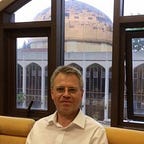‘Not in Front of the Muslims …?’
What does Ethical Dialogue look like?
I went to a talk recently on ethical inter faith engagement. The speaker may have hit a nerve, we are not often asked if our dialogue is ethical, though this is familiar territory for the Christian Muslim Forum, having produced some Ethical Witness Guidelines for use when our two faiths meet. He suggested that, for example, Christian responses welcoming the Common Word declaration run the risk of not clearly distinguishing between Islamic and Christian monotheism, that too much is unsaid if we (Christians) do not bring the Trinity into our dialogue. Is there something missing if we blandly say that we (Christians and Muslims) believe in the ‘same God’?
So how can Christians involved in inter faith respond to this ethical challenge? How do we move into more difficult areas? How do we share our disagreements? Having been involved in this dialogue for some years I am convinced that first of all we need to be patient with each other. Dialogues have been harmed by, impatience, having unrealistic expectations and holding our dialogue partners to account. We cannot bring too much ego into our inter faith encounter, where egos go there is a risk that ethics, or at least etiquette, leaves. The big challenge, if we want to have a deeper encounter, is to open ourselves, to share our vulnerabilities and to listen, without too much desire to speak. We should gain the trust of our dialogue partners, then we can open up the bigger questions. It requires maturity and a sense of our shared history together.
I often feel embarrassed when Muslim speakers have given a perfectly reasonable and encouraging picture of Islam and the following Q&A session begins with Christians asking — ‘But why doesn’t Islam say this or that? Why is it not as developed as Christianity in this area?’ (please supply your own examples!) It may be that these are valid questions and observations, but are they asked with humility, with good grace, do they give an opportunity to expand, or are they veiled, or not so veiled, criticisms? Have the questioners fully understood the Islamic position that they seem ready to judge?
Inter faith engagement is not about confrontation, even in its mature versions. Yes, there is a place for debate but we must recognise the limits of that debate in the area of belief. Our engagement as people of faith should be characterised by Faith — by good faith if you like — by love, joy, peace, patience, gentleness. Wherever these are missing we have lost our own way and become unethical.
Have we misplaced our ethics because we have not mentioned the Trinity? Every Muslim I have ever met or spoken to has assumed, or commented, on my Christian belief in the Son of God and the Trinity. I have spoken to some Muslim friends and acquaintances about the Trinity and Incarnation but usually it is not necessary, we know what each other believes, we know what our differences are. I wish I could say that any of these exchanges have been particularly productive. I think only one Sufi Muslim was happy just to exchange thoughts without it becoming yet another one of those internet debates full of argument and negativity. Where our ethics are really needed are in building serious trust, showing the best of our religions instead of the worst and taking a genuine interest in each other.
Julian Bond, Director, Christian Muslim Forum
Originally published at www.christianmuslimforum.org.
